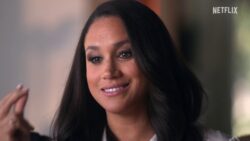Meghan Markle opens up about her racial identity in Meghan & Harry – even if the truth isn’t pretty (Picture: Netflix)
It was beyond predictable that the narrative in the aftermath of Meghan Markle and Prince Harry’s Netflix documentary would be focused on dissecting what they said about the Royal Family and which member they had or hadn’t bashed.
I’m not going to pretend that I also didn’t want the tea on the epic fallout of the century too – and maybe that’s all still to come in Harry & Meghan volume II – but actually, one of the biggest takeaways for me was hearing the Duchess of Sussex speak so candidly about her relationship with her racial identity.
In particular, this quote from Meghan struck me: ‘Obviously now people are very aware of my race because they made it such an issue when I went to the UK, but before that, most people didn’t treat me like a “Black woman”.’
I wasn’t necessarily stunned because of what Meghan said, but more because she said it.
Perhaps because it broaches the taboo topic of colourism within the Black community – and what outsiders may deem as more palatable – and Meghan had to have known that.
She seemed to be believably frank about her lack of racist encounters despite growing up in the US where it’s arguably much more overt than covert like it is in the UK. For the first time, we saw her detail how a stranger ‘screamed’ the N-word at her mother Doria during a road rage incident when Meghan was a child and, more alarmingly, how they never spoke about what happened.
Meghan recalled an incident where a woman ‘screamed’ the N-word at her mother, but they never addressed it (Picture: AFP via Getty Images)
Doria admitted she never had ‘the race talk’ with Meghan (Picture: Netflix)
We also heard how the Duchess was elated to land the role of Rachel Zane in Suits because, for the first time, she was playing a character biracial like herself and not someone racially ambiguous.
In poignant scenes, we heard Meghan explain that she never felt Black enough or white enough being mixed race, and how she had to figure out where she fit both in her career and personally.
And, we heard Doria confess that she never had ‘the race talk’ with Meghan as a child until she experienced the racism she did when she first started dating Harry in 2018 at the age of 35.
Ultimately, they never had to have ‘the talk’ because Meghan is ‘white-passing’ and I applaud both Meghan and Doria for being honest about this, as they essentially recognised her light-skinned privilege in the very fact that Doria didn’t have to warn her about the realities of racism.
So, what is ‘the talk’?
To view this video please enable JavaScript, and consider upgrading to a web
browser that
supports HTML5
video
It’s when a parent has to have a frank discussion with their Black or brown children to school them on the fact that there are some people in the world who will discriminate against them because of the colour of their skin, whether it be in school, relationships, the workplace or social circles.
It speaks volumes that I’ve never had just one particularly memorable conversation about this with my mum – that’s not because she hasn’t spoken about it, it’s because there have been countless talks and often our parents have to remind us about it throughout our life, even when we’re grown adults.
However, colourism is a different beast entirely and is very much an issue within the Black community as much as outside. Lighter-skin being preferential for some people, groups, industries and even nations around the world is something that continues to exist.
Meghan’s revelation about not having ‘the race talk’ is a prime example of that. Due to her being white-passing, she’s rarely been viewed as ‘Black’, especially in the business of Hollywood and therefore she’s never had to experience the harsh realities that a non-ambiguous Black or mixed race woman has.
Meghan said she wasn’t treated as a Black woman until she came to the UK and started dating Harry (Picture: Netflix)
Well, that was until she moved to the UK, of course.
Some on social media have interpreted Meghan’s comments in the documentary to mean that she didn’t identify as being a woman of colour at all but I don’t see that as the case. I see it as her simply being honest about how the majority of the world sees her – as ‘exotic’, racially ambiguous and certainly not Black – and therefore, she’s not experienced racism at a level others have.
That’s very much the issue of colourism and it can only be a good thing that her being open about her experience has sparked a discussion about what that form of racism looks like for different people. The fact that so many of us are debating it on Twitter, Instagram and beyond surely proves that.
We should be openly discussing societal perceptions of light and dark-skinned women because our experiences are not always the same.
Hopefully we can continue doing that but as a way to unite and not divide. If Meghan was brave enough to do it on arguably the biggest streaming service in the world knowing the further backlash it would invite, then surely we can all go forward with sensibly highlighting the issue too?
Got a story?
If you’ve got a celebrity story, video or pictures get in touch with the Metro.co.uk entertainment team by emailing us [email protected], calling 020 3615 2145 or by visiting our Submit Stuff page – we’d love to hear from you.
MORE : Harry and Meghan reminisce on ‘whirlwind’ first dance ahead of Netflix documentary volume 2
MORE : Harry and Meghan warned to ‘stay away’ from coronation following Netflix drama
Harry & Meghan, the Netflix documentary, features the Duchess openly discussing her racial identity.





